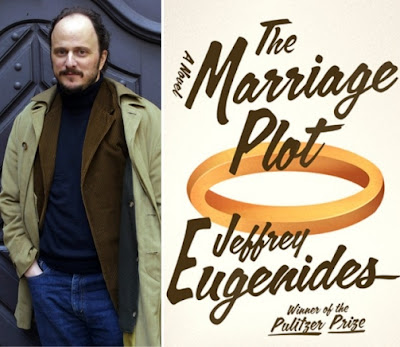A daily journal of our lives (begun in October 2010), in photos (many taken by my wife, Evie) and words, mostly from our home on Chautauqua Lake, in Western New York, where my wife Evie and I live, after my having retired from teaching English for forty-five years in Hawaii, Turkey, and Ohio. We have three children, seven grandchildren, and two great-grandsons, as you will notice if you follow my blog, since we often travel to visit them. : Morning Paddle, 12/06/25 at 8:47 AM
Tuesday, April 10, 2012
THE MARRIAGE PLOT: JEFFREY EUGENIDES
Perhaps Eugenides most readable, most realistic text, THE MARRIAGE PLOT follows the life of one Madeleine Hanna, recently graduated from Brown University, with a degree in English, her thesis on marriage in the novels of Jane Austen (her novels have happy endings: they end with a marriage) and George Eliot (her novels have unhappy endings; they begin with marriage). But it's much more than her interests in Eliot and Austen, though their works inform the text.
She is a atypical college grad, I suppose, a romantic, who falls in love her senior year with Leonard Bankhead, brilliant, intellectual, and the campus Lothario. He's also flawed as she finds out too late. He's a manic depressive on lithium, has been since his breakdown freshman year. We follow their tangled relationship after graduation, his three major breakdowns, her love mixed with guilt and regret, as she tries to make sense of her life, her aspirations and how Leonard fits in. The third strand involves her good friend, Mitchell Grammaticus, a good friend since freshmen year, who has been secretly in love with Maddy since they first met.
We move back and forth between all three lives, mostly Madeleine's, how she juggles her love for Leonard and his breakdowns, her parents and their anxiety towards Leonard, her eventual marriage to Leonard, and his final breakdown and disappearance from her life, to spare her the anguish of having to live with him for the rest of her life. We also get about as good a picture of what it's like to be bipolar, how it makes an individual feel, the amazing highs, where you think you can do anything(the times where Madeleine fell in love with him) and the lows, so deep that all you want to do is die.
As a counterpoint to the relationship between Madeleine and Leonard, we have the quest for meaning, personal and religious, of Mitchell, as he flees to Europe (from his feelings for Madeleine), eventually ending up in India, working at Mother Teresa's Hospice in Calcutta, where he tries to find meaning in giving to others. He realizes finally that it's all an attempt to forget Madeleine and her marriage, that he's not meant to be a saint.
He returns to the States, only to find Madeleine bereft and alone in her parents house after Leonard abandons her. Because they are old friends, he ends up staying with her and her parents, basically the buffer between her parents hopes to have the marriage annulled and Madeleine's guilt at also wanting to do it. Leonard spends his mornings at a Quaker assembly, in silence mostly, finding a kind of peace. The two finally consummate their relationship just before Maddy heads to New York and grad school but it's what Mitchell expected. He's smart enough to realize she is just Maddy's 'survival kit. "She hadn't been coming to him; she'd only been leaving Leonard."
The text ends ambiguously with Mitchell asking Maddy if it would still be a good ending to a story if a guy were in love with a girl but did not propose to her, like Mr Knightley in EMMA. "Yes," she answers and the book ends. Not quite Austen or Eliot, just Eugenides. We are left to wonder what will become of them.
This was a great book, so well written, intensely so, especially in the scenes where Maddy struggles with her love for Leonard, he struggles with his sanity, and Mitchell struggles with his feelings for Maddy and need to find meaning in this world without her. A great book, the best I have read in months.
Subscribe to:
Post Comments (Atom)

No comments:
Post a Comment